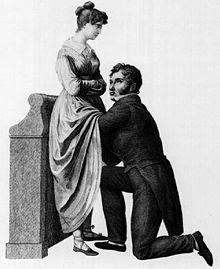Would you rather be right, wrong or interesting?
When I was a medical student rotating on the OB-GYN
rotation, the issue arose if female OB-GYNs were more sympathetic to patients
than their male colleagues were. Before
reading on, what's your opinion here?
There was a view that females in this medical specialty would
have more empathy for patients as they may have experienced menstrual cramps, pelvic pain and childbirth.
No man can relate to these symptoms and they might be expected to be
more dismissive or distant over these ‘minor hormonal disturbances’. In other words, men just don't get it.
A discrete GYN exam 200 years ago
It is true that one who has ‘walked the walk’ may connect
more closely with one who hasn't. For example, since I have never suffered from an addiction, I can never counsel
a drug addict or alcoholic with the same street cred as one who has triumphed
over these afflictions.
The chief of the OB-GYN department at my medical school was sitting with us
students as this discussion unfolded. The
chief was a veteran physician and had trained several scores of OB-GYN
physicians. While this is not a scientific study, in this
physician’s opinion, male gynecologists and obstetricians in the training
program were consistently kinder and more understanding to patients than female
physicians were. The chief speculated
that females, contrary to prevailing intuition, might be less empathic as they’ve
had menstrual cramps, etc., and' they’re not that bad’. Men, in contrast, might be more sympathetic to female pains and conditions as they tended to be spooked by symptoms that
they will never have.
I am not offering an opinion on the issue, but am simply relating one chief's view.
I am not offering an opinion on the issue, but am simply relating one chief's view.
Do you think the chief was male or female? Might this have influenced the chief’s
conclusion?
Is the chief right or wrong? Can’t say, but it was interesting and I’ve never forgotten it, even 30 years later.


Actually from my personal experience, I found male GYN's more sympathetic.
ReplyDeleteMy experience: male BO-GYNs with more experience were more thoughtful and responsive than the younger male MDs. I was having my children in the '80's, and males still out-numbered females in the field (and may still.). The female OB-GYN who delivered our second child was much less thoughtful, discharging me after a c-sec (all night labor before delivery of our 10 lb.+ son) after the 2nd day. I was exhausted, running a mild temp, and very uncomfortable, but the HMO rewarded this speedy ouster. I wouldn't extrapolate to characterize the male/female difference, but ...that was my experience.
ReplyDeleteBTW, read your post on KevinMD's blog.....and I would not have identified the song or the artist; I'm 72. (Not into rock music, need I add...)